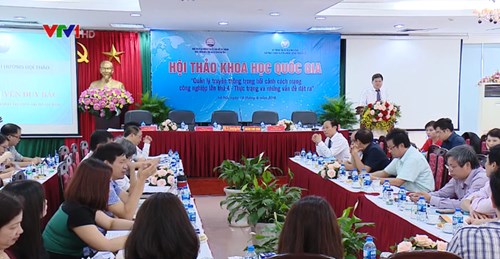Associate Prof. Dr. Truong Ngoc Nam, Director of the Academy of Journalism and Communications under the Ho Chi Minh National Academy of Politics, said the fourth industrial revolution has exerted strong influence on communications, including the reception of information from readers.
    |
 |
|
At the seminar. Photo: vtv.vn |
The public not only proactively choose the information and decide what they want to read but also contribute to delivering messages, he said.
The boom of social networks like Facebook and YouTube makes it difficult for relevant agencies to keep information under control, Nam said, adding that management agencies have to deal with an “open” but “virtual” space with an array of issues relating to traditional security, hackers and dangerous information crimes.
Therefore, it is essential to adopt proper measures to limit negative impacts caused by untrue information on social networks on public opinions, he added.
Deputy Director of the Radio, Television and Electronic Information Department under the Ministry of Information and Communications Le Quang Tu Do said the management of information on social networks in Vietnam is facing a number of difficulties due to the boom of the internet and particularly social networks.
He suggested making appropriate investment in this field via building a single management model for information on social networks and strengthening coordination among relevant ministries and departments.
Vietnam has more than 58 million internet users out of its 90 million people and over 125 million mobile subscribers.
According to a report released recently by the Internet Society, 7 million Vietnamese people have used the new-generation internet so far.
The use of Internet Protocol version 6 (IPv6) in Vietnam in the first half of 2018 grew 6.54 percent, lifting the usage rate of IPv6 to 14.43 percent and helping Vietnam ranks 25th in the world, fourth in Asia after India, Japan and Malaysia and second in Southeast Asia in the rate of IPv6 usage.
Statistics from the Asia-Pacific Network Information Centre (APNIC) show that the global IPv6 application rate stands at about 17.75 percent.
IPv6 is paving the way for the explosion of smartphones, tablets, IoT devices, and other Internet-enabled devices, fundamentally altering the way people, organizations and governments are connected around the world.
Source: VNA